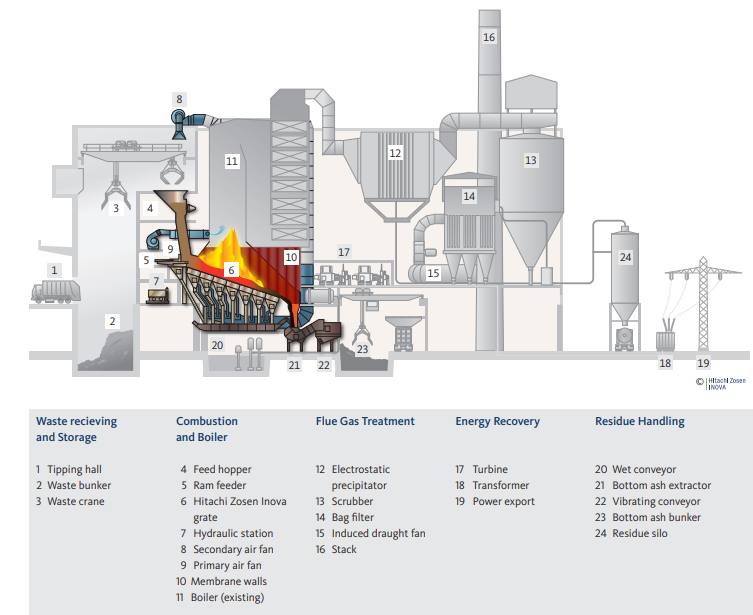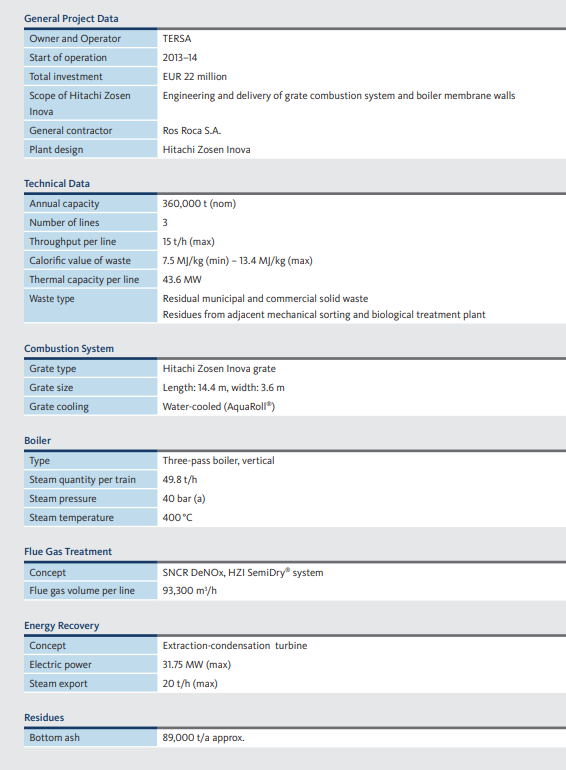Sant Adrià de Besòs / Spain
Sant Adrià de Besòs / Spain
Retrofitting a forty-year-old Kanadevia Inova grate for today’s waste and state-of-the-art performance
One of Kanadevia Inova’s earlier grate-fired Waste to Energy plants (WtE) was delivered to the city of Sant Adrià de Besòs in 1975. Having reliably processed waste over a 40 years period, between 2012 and 2014 the three old grate firings were completely retrofitted. The treatment of up to 360,000 tonnes of municipal solid waste per year makes the plant a central pillar of Barcelona’s waste management system.
Integrated Waste Management in the City of Barcelona
The WtE plant of Sant Adrià de Besòs is located in a former industrial zone north of Barcelona. During the last decade the area has developed into a modern city neighborhood, including a marina and beach adjacent to the plant.
The WtE plant is integrated with one of Barcelona’s Eco Parques (mechanical-biological treatment plants), from which it receives treatment residues. These residues are mixed with non-treated municipal solid waste in the bunker, and thermally treated to produce electricity, heat and cold for supply to local grids.
State-of-the-Art Technology for Safe Waste Processing for the Long Term
After close to forty years of reliable waste processing Kanadevia Inova’s robust but outdated grate system was renewed. The new water-cooled grate combustors now feature state-of-the-art technology, resulting in better combustion control, increased steam production and stability, fewer ash riddlings under the grate, lower water content in the bottom ash, and reduced wear to the grate bars.
Challenges for Grate and Boiler Design
A major challenge for the plant owner and operators is changing waste qualities over the lifetime of the plant. When this plant was conceived in the 1970s, the heating values of collected wastes were lower, in the order of 6–7 MJ/kg. Owing to economic growth and changes in the habits of the population and waste handling processes, the heating values of the mixed waste received by the plant can now be up to 9 to 10 MJ/kg. The client, TERSA, also wanted the retrofit of the grate to increase the thermal capacity of each line by 14% to enable it to cope with the changes in waste properties at constant waste throughputs. Kanadevia Inova’s engineers were challenged by making the necessary design adjustments to the new grate and existing boiler to fulfil the client’s expectations, and adapting to the constraints of the existing arrangement. They mastered these challenges to the client’s full satisfaction.
Effective Energy Use to Cover Local Energy Needs
The thermal energy released by the combustion process is recovered in a boiler producing superheated steam. Following the retrofit, the plant is able to produce up to 31 MW of electrical energy with two steam turbines. About 90% of the electricity produced can be exported to the local grid. Besides this, steam extracted from a turbine is delivered to an adjacent plant, where the heat is transferred either as district heat or used to produce district cold with absorption pumps.
Integrated Thermal and Material Recycling
Despite the preprocessing of waste in the Eco Parques, the bottom ash still contains more than 5% ferrous metals, which are recovered on site by a magnetic separation process.


